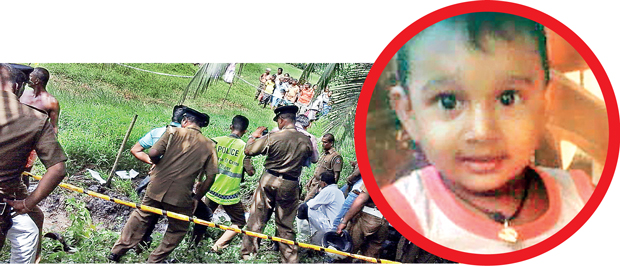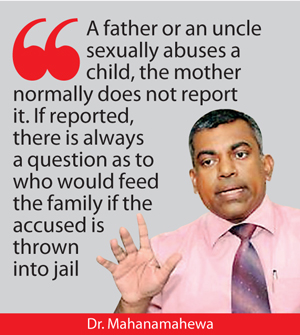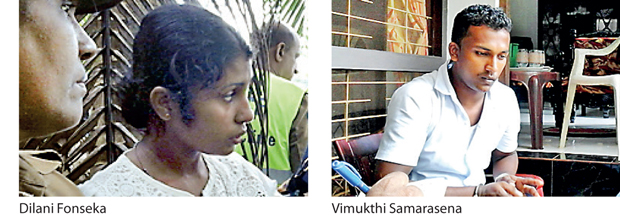Reply To:
Name - Reply Comment


The act of murder has become a habit for some. The psychotic actions of certain people who eventually become criminals are quite absurd at time. It won’t be before long when even newborn infants will become party to these horrible crimes that living in this world today has become quite uncertain. As the crime rate is exponentially on the rise, every day some innocent soul sacrifices his or her life to a brutal crime. Following is the story of S.V. Minul Devthis who sacrificed his life to an arrogant individual.
The incident
Dilani Fonseka, a single mother from Mahiyanganaya had been working at a garment factory in Nawagamuwa ever since her husband left the family. While working there, she met and developed a relationship with her colleague Vimukthi Samarasena. In order to make travelling easier, Dilani rented out an annexe at Godagama. However, as they continued with their affair, Vimukthi became a regular visitor to her annexe. During the night of May 7, 2016, he visited Dilani and her only child Minul Devthis, who was two-years-old. The following day, the child was playing with his toys in the room when Vimukthi joined him.

While they were playing, little Minul’s fingernails accidentally scratched Vimukthi’s skin and that roused his anger. He lost his cool and slapped the innocent child many times on his face and yelled at Dilani that her son had the same features as his father. Dilani screamed to stop slapping the child. But Vimukthi did not. Instead he took a broomstick from under the bed and started clubbing Minul on his tender chest, stomach and back. When he stopped the carnage, little Minul became unconscious and fell on the floor. However, Dilani assumed that Minul was still alive and tried artificial resuscitation to help him regain consciousness. But she saw blood oozing out of his mouth and then only the duo realised that little Minul was no more.
When Vimukthi realised the crime he had committed, he threatened Dilani to not reveal this and said that if she did, they would end up in prison. So they waited till dusk to bury Minul’s remains. Dilani draped Minul’s body with a piece of cloth and carried it to an abandoned land closer to Vimukthi’s house. Vimukthi dug a pit and buried the body. However, Dilani took the piece of cloth home.
When her husband tried to contact her several times to question about the child, she lied to him saying that he was sleeping. As she was unable to repeat the lie over and over, she told him that the child fell from the stairs and died and she dumped the body in the Kelani River. After listening to this, her husband came in search of her and it was only then that she confessed what exactly had happened.
The aftermath
According to our correspondent Irangi Edirisinghe, the Athurugiriya Police is conducting investigations on the murder. However, when the police visited the scene, Minul’s body was found to be missing from where it had been buried. At this juncture, Dilani gave a different statement saying that on May 11, Vimukthi had called her and said that Minul’s body would be taken out for some reason and said he would hide it again.

A Few body parts were discovered : Athurugiriya OIC
According to Athurugiriya OIC Senior Inspector of Police Sanjeewa Mahanama, a few parts of human body that were suspected to be Minul’s were discovered in a nearby shrub. He said Dilani was arrested and Vimukthi would be produced in courts.
We must protect our children; they are our future: Dr. Prathiba Mahanamahewa
Speaking to the Daily Mirror, former Commissioner of the Sri Lanka Human Rights Commission Dr. Prathiba Mahanamahewa said that in Sri Lanka, the main cause of child abuse is the behaviour of parents.
“In most of these incidents, we found that parents do not understand their children nor do they know what children’s rights are. Children tend to make mistakes and parents shouldn’t be harsh on them. But, what happens is some parents punish them brutally. There was an example where a retired army officer wanted to feed his child but because he didn’t eat, he brutally tortured the child and killed him. Parents should know how to treat kids. The other problem is addiction to drugs and alcohol. When people are intoxicated, they are not in their proper senses and want to take revenge and behave violently including with their own children.”
He further said that the mental health of most of the adults too needs to be monitored. “Psychiatric disorders could also lead to these types of murders. Another serious issue is that most of the cases of incest go unreported mainly because the mothers are not economically empowered in Sri Lanka. Therefore, when a father or an uncle sexually abuses a child, the mother normally does not report it. If reported, there is always a question as to who would feed the family if the accused is thrown into jail. Also when women migrate, they don’t have any alternative arrangements to look after their children, and therefore, the children are vulnerable to all types of harassments.”
Speaking about the legal framework addressing child rights, Dr. Mahanamahewa mentioned about the existing laws in the country. “In 1995, there was an amendment introduced to the Penal Code, then in 2006, we introduced laws against child trafficking. In most cases, it takes a long time to get the judgement delivered and these cases get dragged on and finally dismissed. But on cases, of this type, I suggest that action should be taken within 6 months.
The LLRC recommended that there should be a special court of justice similar to Labour Tribunals set up to address issues concerning child rights. In Sri Lanka, another disturbing issue is the fact that offenders and perpetrators are granted bail while the victims are made to suffer. This is mainly because they receive political patronage and also powerful people protect them. Implementations of these laws still remain at the preliminary level.
There are several bodies that address issues concerning child rights and children’s welfare. But a majority of cases come up due to the lack of understanding between the parents and the children. Therefore, I suggest that there should be a proper enactment and implementations of the laws, and verdicts should be given within 6 months; family relationships should be discussed and taught in schools and children should be educated of the family environment.
Sri Lanka is a part of the Child Rights Convention, and therefore, we must ensure that the laws are in place and we must protect our children because they are our future.”